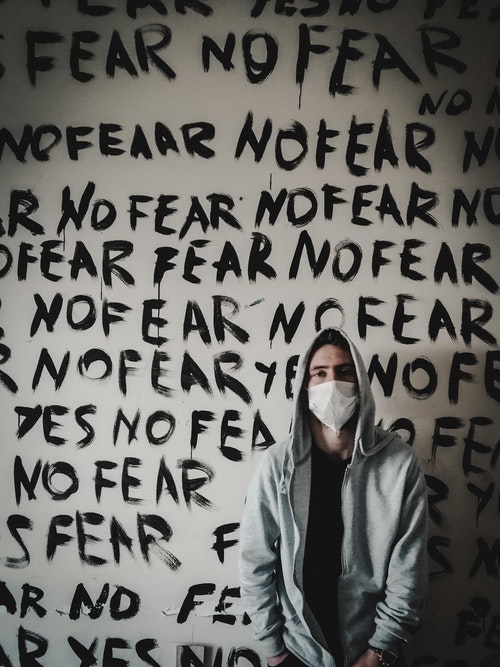Emotions affect immunity
By Liza Horan
The UK government is set to announce on Sunday its plans to transition from lockdown restrictions to greater movement, larger gatherings and business openings. While the new guidelines are anticipated to retain social distancing measures and include the use of face masks, they’ll be a welcome nudge toward resuming life outside the home after seven weeks in lockdown.
It’s a test: Can we maintain the downward trend of coronavirus cases?

That depends on how we respect the guidelines. Even if one follows guidelines to the letter, the next lax person could negate that good behaviour. Someone can unknowingly carry and spread the virus. With reports of reinfection occurring, the virus mutating, and second waves of new infections happening — including the upcoming flu season — everyone continues to be a suspect.
The unmasked stranger coughing without covering.
The ungloved shopper touching every product.
The upwind cyclist hollering to friends behind.
The walkers hogging the whole pavement.
The panting runner passing too close.
Life under lockdown taught us that leaving our cocoon means our defenses go up. We cross the street to avoid interaction. We flinch when a body turns the same corner. We scan all angles to steer clear of another.
And now Phase 2 of the coronavirus crisis presents a dilemma: How do we adopt a more public life knowing that risk still exists?
We remain at one another’s mercy. Vigilance has become a way of life.
Fear serves us…
“The assortment of thoughts and emotions you will experience in a survival situation can work for you, or they can work to your downfall,” reads the U.S. Army Survival Manual. “Fear, anxiety, anger, frustration, guilt, depression, and loneliness are all possible reactions to the many stressors common to survival. These reactions, when controlled in a healthy way, help to increase your likelihood of surviving.”
…up to a point
Primal instinct may have taken over for us in the first phase of lockdown. Fear of catching Covid-19 motivated us to observe guidelines. It worked to keep us safe. But if we let that fear instinct overwhelm us, it will hurt us.
“When you cannot control these reactions in a healthy way, they can bring you to a standstill. Instead of rallying your internal resources, you listen to your internal fears. These fears will cause you to experience psychological defeat long before you physically succumb,” the Manual says. “Do not be afraid of your ‘natural reactions to this unnatural situation.’ Prepare yourself to rule over these reactions so they serve your ultimate interest—staying alive with honor and dignity.”
While fear served us in Phase 1, it could hurt us in Phase 2.
Negative emotions weaken immunity
Research in the field of psychoneuroimmunology, also called affective immunology, has proven that stress weakens the immune system, negative emotions are linked to a lower immunity, and positive emotions can enhance the immune system.

We need just enough fear to comply with official guidelines, but too much could make us more susceptible to the virus.
So, how can we surpass fear and fortify our defenses to coronavirus?
To start, we can comply with official guidelines to protect ourselves and others. And we can take care of ourselves physically (nutrition, rest, movement) and mentally (emotional support, keeping up social connections, pursuing leisure activities).
Then we can choose our attitude and behaviour.
It may feel as though government guidelines have us tethered against our will. The news is full of conflicting opinions and different approaches are playing out with varied results across the world. While we can’t opt out of the prevailing situation, we must identify what we can and can’t control. We can control our internal world and how that expressed itself externally. We cannot control the government’s rules on social distancing and movement, nor can we control others’ behaviour.
How we react to others’ behaviour may be toughest because it’s the biggest unknown variable to catching coronavirus.
How can we switch from suspicion to compassion?
Consider that we are all in this together. We are only as strong as the weakest link — the person who flouts the guidelines, doesn’t take care of themselves and conducts themselves poorly in public.
Does avoiding eye contact boost our immunity?
Does sneering through a face mask scare off germs?
Does cursing under our breath right others’ wrongs?
Does turning a cold shoulder alleviate loneliness?
Does silence keep us safer?
No. Not only do they not help us, those negative emotions hurt us.
Flip the fear and test the power of a smile next time you’re out. See how it affects you some when someone smiles back.
“Just as some diseases are contagious, we’ve found that many emotions can pulse through social networks,” says Harvard Medical School professor Nicholas Christakis, whose research shows happiness is a collective phenomenon.
To take the positive, try to:
- remember we’re in this together
- be patient with yourself, then with others
- be kind to yourself, then those who cross your path
- affirm to yourself that you can handle anything that arises
- make eye contact
- smile
- nod or say ‘hello’
- be a model for others
Temperance may be fatigued, patience frayed and resolve weathered as we head into this next phase of the coronavirus crisis. But what got us through Phase 1 is unsustainable.
How will we show up in this sustained “temporary” situation? Will we come from a place of fear or love when we step out? How will we meet the challenges it brings? How will we handle testy scenarios? How will we treat strangers?
Coronavirus still is contagious. So is happiness.
Vigilance with humanity is possible: Defenses up, hearts open.

Photo/Mindstream

